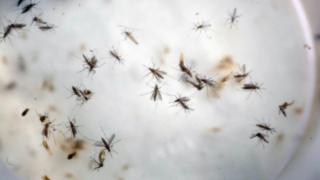Disir
Platinum Member
- Sep 30, 2011
- 28,003
- 9,611
- 910
We in the global north had not heard much about the tiny Aedes aegypti mosquito, the primary transmitter of Zika virus, before the disease was linked to an epidemic of birth defects and the paralyzing Guillain-Barre syndrome.
The mosquito was unfamiliar because it normally thrives no farther north than Alabama.
But recently scientists found an isolated population of Aedes aegypti that has managed to survive in a small bubble of warmth: Capitol Hill.
Found through much of the tropical and sub-tropical world, Aedes aegypti sometimes makes it north of the US’s gulf states before winter temperatures kill it off. But in a paper published in the American Journal of Tropical Medicine and Hygiene last year, entomologists confirmed a group of Aedes aegypti living a few blocks from the Capitol. As far as they know, it’s the only documented Aedes aegypti population anywhere north of its typical range.
As of now, the Capitol Hill mosquitoes are free of Zika, but that could potentially change.
“It’s a small population, so the chances of human transmission are modest. But, for me, as an entomologist, it’s like a little red flag.” said Dave Severson, a medical entomologist with the University of Notre Dame, who has worked with the species most of his career. “It’s unprecedented for this mosquito to be breeding in this climate.”
There's a Group of Zika Virus Mosquitos Living in Washington, DC
I know, right? It's like right there.....gifted, even.
The mosquito was unfamiliar because it normally thrives no farther north than Alabama.
But recently scientists found an isolated population of Aedes aegypti that has managed to survive in a small bubble of warmth: Capitol Hill.
Found through much of the tropical and sub-tropical world, Aedes aegypti sometimes makes it north of the US’s gulf states before winter temperatures kill it off. But in a paper published in the American Journal of Tropical Medicine and Hygiene last year, entomologists confirmed a group of Aedes aegypti living a few blocks from the Capitol. As far as they know, it’s the only documented Aedes aegypti population anywhere north of its typical range.
As of now, the Capitol Hill mosquitoes are free of Zika, but that could potentially change.
“It’s a small population, so the chances of human transmission are modest. But, for me, as an entomologist, it’s like a little red flag.” said Dave Severson, a medical entomologist with the University of Notre Dame, who has worked with the species most of his career. “It’s unprecedented for this mosquito to be breeding in this climate.”
There's a Group of Zika Virus Mosquitos Living in Washington, DC
I know, right? It's like right there.....gifted, even.




